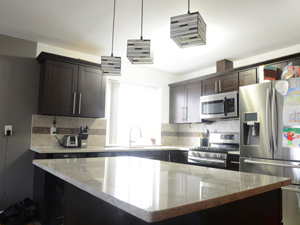
As the seasons change, so does the amount of sun beaming through your windows and bringing its UV rays into your home and onto your countertops. Unfortunately, prolonged direct sunlight can cause damage, manifesting as fading or darkening on some granite countertops.
“Natural stone treated with resins are vulnerable to damage from direct sunlight,” says Fred Hueston, Chief Technical Director of Stone and Tile PROS. Applying resin to natural stone is now becoming commonplace because it strengthens the slab, allowing companies to eliminate waste from breakage during manufacturing and shipping.
Keep in mind that engineered stone, or quartz surfaces, as they are often called, are bonded with resins, making them susceptible to this same sort of sun damage as well.
Preventing Fading
Your natural stone countertops are an investment and you want to keep them looking beautiful for years to come. You can always check with your fabricator to see if your stone has been treated with resins, but it’s always a good idea to play it safe. Taking some simple precautions to minimize the time your countertops will be exposed to direct sunlight will go a long way. Simply closing the blinds during peak sunlight hours can be enough to prevent the damage.
For outdoor kitchens, consider a cover for your countertops when they are not in use. There are also some new innovative products on the market that can be applied to stone that act as a sunscreen to block UV rays.
Already have damage?
The good news is that natural stone that has faded by sunlight can be repaired. Stone that is not resined can be honed and repolished by a professional restoration company to bring it back to life. If it is resined, there are chemical dyes that can be applied to return the stone’s color.
If you have questions or concerns about your natural stone fading or darkening, contact us today.
This is one of a series of articles written and published on behalf of Stone and Tile PRO Partners.

